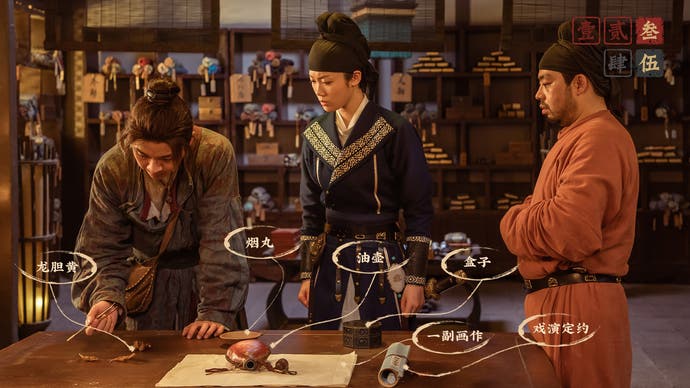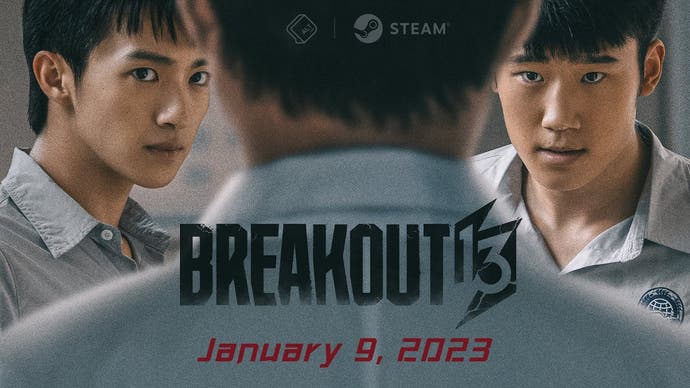Exploring the new world of Chinese FMV games
From The Invisible Guardian to Underdog Detective.
In January 2019, The Invisible Guardian (or 隐形守护者 in Chinese), a story-rich historical full-motion video game, or FMV, was published on the Chinese, Hong Kong, and Taiwanese Steam pages, as well as WeGame. It became a great hit, despite not receiving much advertising. It maintained a rating of 9/10 on Steam with over 48,000 reviews and 9.6/10 on Douban (essentially the Chinese equivalent of IMDB for games, movies, books, and other media), with around 32,000 reviews. Additionally, it earned a BAFTA Breakthrough China trophy, solidifying its status as one of the most acclaimed and best-selling games of recent years.
Its nuanced storyline and multi-layered characters pleasantly surprised those who initially thought the game would be a typical anti-Japanese war drama. It even shattered the expectations of those who believed it might be a cheap imitation of the beloved Japanese adventure game, 428: Shibuya Scramble.
Where did it come from? In 2015, a group of six individuals passionate about interactive filmmaking embarked on experiments with various game design formats. They also enlisted students to act out their scripts. One of their initial projects was The Secret Life of the Empress Dowager Cixi, an interactive novella game (often called 'visual novel') featuring live-action actors. This narrative explored the real-life journey of a concubine who ascended the ranks to become the Empress of China.
During their research, the developers immersed themselves in similar games, like Heavy Rain. Their exploration led them to a significant revelation: the ideal scenario for a choose-your-adventure game would be a spy story set during times of political turmoil. In such a setting, players would not only grapple with difficult decisions to survive dire circumstances, but they would also need to decipher people's hidden motives.

While games like Heavy Rain served as sources of inspiration, the production of The Invisible Guardian didn't adhere to the traditional development process of most games. People contributed to the project in any way they could, and the majority lacked prior experience in their respective roles. For instance, dressmakers, makeup artists, and props specialists had to undertake research and educational courses right in the midst of shooting. Sylvia, the lead narrative designer, comments, "There were unexpected challenges every day, and we had to adapt to new obstacles as they arose." They even had to dip into their own pockets to pay professional music studios. Despite the haphazard production schedule, The Invisible Guardian is an exceptionally polished game that doesn't reflect the challenges of its development.
What makes The Invisible Guardian special isn't just the game itself but what it has ignited. Ding Liang, a producer at Tianjin Yunyun Technology Co., Ltd., serves as a prime example of an experienced game designer who drew inspiration from The Invisible Guardian to create his own interactive FMV. "When I played The Invisible Guardian, it reminded me of other novella games like Ace Attorney," he says. "I thought, instead of clicking on dialogues to interact with semi-idle sprites in the background, how exciting would it be to have movie-quality live-action sequences narrating the investigation?" This inspiration led to the formation of Tianjin Yunyun Technology Co. and the creation of a detective FMV title, Underdog Detective (or 神都不良探 in Chinese), following in the footsteps of point-and-click adventure games, but incorporating the branching narrative style of The Invisible Guardian, and set during the Tang Dynasty.
Unlike The Invisible Guardian or 428: Shibuya Scramble, a Japanese adventure game that used live-action actors and was the source of inspiration for The Invisible Guardian, Underdog Detective is entirely live-action and omits idle images. The game features various intriguing mechanics from different genres, such as investigating crime scenes by clicking on points of interest and selecting the right person to accuse using rotoscoping.
Ding Liang explains that production was exceptionally challenging, more so than any game he had worked on before. His reasoning lies in the unique nature of FMV development. In this format, making changes, unlike traditional digital games, proves exceedingly difficult. If everything isn't filmed and produced to perfection from the outset, it becomes nearly impossible to gather the actors and production team, especially with a limited budget, to reshoot scenes. Furthermore, Liang mentioned that the production value is often on par with Chinese dramas and it may be one of the reasons why they are successful in the country. Many of the actors in FMVs also act in Chinese dramas which helps attract more people.

According to Liang, creating an FMV game is akin to making a movie, but with a significantly limited budget, a much longer production timeline, and a multitude of challenging obstacles that can eventually wear you down. In fact, this is precisely what many FMV productions in China face. Liang also mentions that numerous projects were initiated following the tremendous success of The Invisible Guardian but weren't as fortunate as Underdog Detective.
One distinctive feature of Underdog Detective compared to The Invisible Guardian is that its developers chose to localize the game in English, Japanese, and Korean. While the quality of localization often leaves room for improvement, it was still a step in the right direction.
However, FMV games, much like the majority of Chinese games, continue to grapple with what can only be described as the "curse of Chinese exclusivity." Many games either lack any form of localization or suffer from inadequate translation efforts. Ruyou Wen, a game studies scholar at the University of Canterbury suggests this might be due to the assumption that Chinese FMVs won't be popular outside of the country and the sales won't compensate the money and effort that is needed for quality localization.
To put this situation into context, it can be likened to the early days of Japanese games when only a select few made it to the Western market. The idea of localizing a game such as Shin-Chan: My Summer Vacation would have been unheard of, and even prestigious titles like the Final Fantasy series received questionable localizations.


In January 2023, Breakout 13 was released on Steam, an internationally well-received title that tackles the issue of 'medical treatment for video game addictions' in mainland China. Inspired by a true story involving a rehabilitation camp that employed electric shock therapy and inhumane practices to 'cure' children's video game and internet addiction, Breakout 13 tells a powerful yet witty story that garnered significant attention.
This game is exceptional not only due to its quality and themes but also because it boasts an almost flawless English translation, setting it apart from the often clumsy translations found in many Chinese titles previously mentioned. The game had a substantial budget, with a significant portion dedicated to crafting a polished, high-quality English script.
Shurui Zhang, a game designer at Gamera Games, a company with a successful global presence, suggests that the success of Breakout 13 could perhaps pave the way for further investment in localization of such titles. Zhang, as well as Liang, mentioned that the overwhelming presence of C-Dramas and their influence have helped foster a massive audience for FMVs which are essentially 'interactive C-Dramas'.
With the growing interest in FMVs or novella games among Western developers and gamers, it appears that there might be potential for this cultural zeitgeist to gain international recognition. Titles like Late Shift, Her Story, and As Dusk Falls have been building fanbases for imaginative FMV/visual novels. And while FMVs remain niche in the West, it doesn't have to stay that way.









